Panel Discussion
Michael Cavallo
Former Executive Director, United States Chess Federation
Chris Chase
Chess Life Master, co-editor of The Boston Globe chess column
Eric Godin
Chess Life Master
by Charles Munitz (aka BADMan)
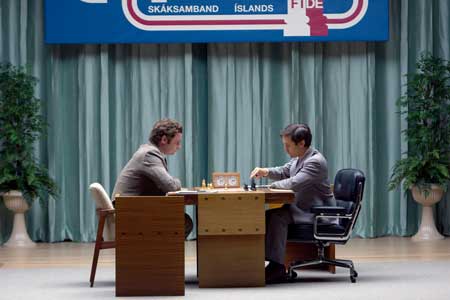
Tobey Maguire as Bobby Fischer
in “Pawn Sacrifice”
Photo: Takashi Seida
The new film, Pawn Sacrifice, directed by Ed Zwick, tells the story of American born world chess champion Bobby Fischer (1943-2008), and dramatizes the celebrated tournament he played in 1972 with then Soviet world champion Boris Spassky in Reykjavik, Iceland.
I recently met with two Boston-area chess Masters, Eric Godin and Chris Chase, and with Michael Cavallo, former Executive Director of the United States Chess Federation, to talk about their attractions to the game, about chess in Boston, and about Fischer, the Fischer-Spassky match and the new film. The following is adapted from that conversation.
Chase has been for the past four years the co-editor of the chess column for The Boston Globe. Previously, he was the director of Management Information Systems for the New England Shelter for Homeless Veterans in Boston.
Godin is an innkeeper who has worked for many years at The Apple of Boston Guest House in the South End.
In addition to acting as Executive Director of The United States Chess Federation for three years, Cavallo was a successful commodities trader who managed his own financial services firm, worked on global warming issues for the Clinton Foundation, and funded The Cavallo Prize for Moral Courage in Business and Government which provided awards to whistle-blowers.
CM (Charles Munitz): Give me a quick summary of your affiliations with chess.
EG (Eric Godin): I grew up in Connecticut, have been in Boston since 1989, and have been a member of the Boylston Chess Club since 1990. I’m a Life Master and still play quite frequently.
CC (Chris Chase): I’m also a Life Master, have been a member of the Boylston Chess Club since the 1970s, and have lived in Somerville since 1980. My home town is Newburyport. I started playing chess in the early 1970s, partially because of Bobby Fischer and “the match” in 1972. I’m a three time New England champion. I’m also the co-columnist for the Boston Globe chess column which comes out on Sundays and Mondays. They cancelled us at the end of last year but we started a social media campaign to save the column, and we did! The New York Times canceled its chess column last year and it seems, unfortunately, there is no bringing that back.
MC (Michael Cavallo): Sometimes I’m rated as a Master, sometimes an Expert, and have been playing since age 6. I was New York City junior champion in college, Cleveland junior champion in high school. Every eight years I come out of retirement and play a few tournaments, and I’ve done that again this year.
CM: What was your attraction to chess early on?
EG: I learned chess in fourth grade but I didn’t even know how to castle until eighth or ninth grade. Then I learned about chess tournaments, found some chess books in the library and it took off from there.
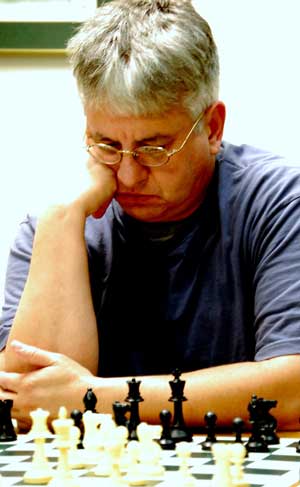
CC: I was at a party in the eighth grade and there was a college age kid there who was actually a rated player and he showed me around the board. I began to play with my brother and to get into chess theory and it just sort of captured me. I played in my first tournament when I was in the eighth grade and it’s been downhill ever since.
MC: I was good at games. At three or four I was beating adults at checkers. My mother asked if I wanted to learn chess and I said sure. She didn’t know how to play, but she got one of those plastic sets which came with instructions which she read because I didn’t yet know how to read, and she taught me the game. In late elementary school I came across the Cleveland Chess Bulletin at the public library, found out about the club in Cleveland and began to play seriously after that.
CM: What do you find are chess’ most enduring and compelling qualities?
EG: It’s art, science and sport. Each of those has its attraction to me, but it’s the aesthetics of it that I like the most.
CC: It’s a wonderfully beautiful game – at times! It’s also very hard; there’s always something new to learn, and I find that very appealing. It’s a struggle, but you can get better at it.
MC: It puts a little adventure in your life. You go off and do battle with people who are very good at what they do. Marcel Duchamp, the artist, mostly played chess in his later years and he said about chess players that unlike some of the artists he knew who were very good at cashing in, chess players were true artists, doing something that takes a lot of time and effort without compensation.
CC: Especially in this country, chess is regarded primarily as an art form. We chess players do so much for so little, because we love it, not for money or social prestige. There’s a purity in that which I find very attractive.
CM: You have mentioned your involvement with the Boylston Chess Club. Would you call that the hotbed of chess in Boston?
EG: It’s the only chess club that is open to membership and has several activities per week. It attracts players of all levels and from all walks of life.
CM: How many people typically show up at the Boylston Chess Club?
CC: Tournaments there draw usually between thirty and forty players. Originally the Boylston Chess Club was located in the Young Men’s Christian Union building in the Combat Zone in Boston, where it was located for many years. Because of that unique location it had a unique membership. You’d be playing on a Saturday night and hear screams and sirens and sometimes shots outside. It was a pretty interesting way to play chess.
CM: Do you still compete?
EG: Currently I’m competing in the Boylston Chess Club Championship. It’s a ten player round robin with all Masters plus two other qualifiers. I won my first round!
CC: I’m going to the Hartford Open in a couple of weeks.
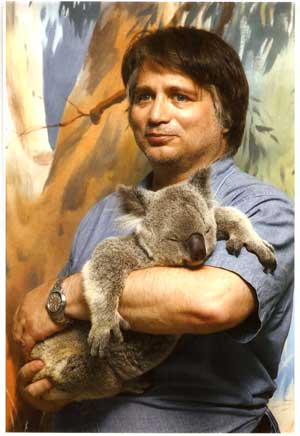
with a non chess-playing friend
MC: The next tournament I’m playing in is called the Millionaire Chess Open in Las Vegas.
CC: They guarantee one million dollars in prizes. Though the money is appealing, I am concerned about cheating. Sometimes people cheat in chess even when no money is involved; and here there’s a lot of money. I’m leery about getting involved where the security for such things is not really tight. There are lots of schemes, from tapping positions into handheld computers to signaling through earpieces.
MC: In a lot of tournaments these days they’ve banned earpieces altogether. It used to be you’d get people who were probably just listening to music but now they can’t do that anymore because it’s so easy to cheat that way. I remember when, in a national high school championship, I thought someone was cheating against me. Sometimes people walk off in the middle of a game to go to the bathroom or something, but the guy I was playing walked away for half an hour during his move – I think he was off analyzing the position with somebody.
CC: Back in the days before computers, they’d go back to the room, or go to the book exhibit often attached to the tournament, and look up answers.
MC: In a complicated middle-game position, some would even go off with a board to consult with a highly rated Master.
CM: Who are the grandmasters in the Boston area and who, historically, have been the greatest chess players to come out of Boston?
EG: The strongest player in greater Boston is Grandmaster Alexander Ivanov, originally from Siberia, Russia, now in his late fifties. He’s won the US Championship, and for many years has been one of the top tournament players in the US. He used to play at the Boylston Chess Club, but there’s not really enough competition for him there. Larry Christiansen, originally from California, also in his late fifties, is a three time US Champion, but he’s now retired from active play. He still does simultaneous (multiple individual opponents at one time) chess playing at South Station once a month.
CC: Henry Nelson Pillsbury (1872-1906) came out of Somerville and is buried in Reading. He was a world championship contender at the turn of the twentieth century, until he died in his early thirties from syphilis. He’s probably the strongest player to originally come out of Massachusetts. Sam Sevian, now a fourteen year old living in the Boston area, will probably become the strongest one of the group. Eugene Perelshteyn (in his thirties), plays chess but he’s not really a professional player – he’s got a day job.
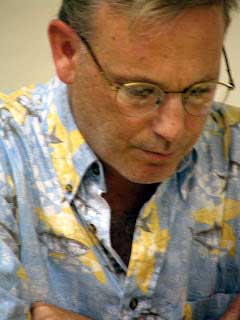
EG: A former two-time US Champion grew up in Belmont – Patrick Wolff (in his forties). He has lived in California for several years now. He coauthored the Boston Globe chess column before Chris Chase did it.
MC: Another retired Grandmaster in the Boston area is Ken Rogoff, who grew up in Rochester, NY and is now a professor of economics at Harvard and former chief economist of the International Monetary Fund.
CC: Though Ken hasn’t played in years…
MC: I played him in Rochester when he was in high school!
CM: Do you guys remember when Bobby Fischer appeared on the scene?
EG: I first seriously heard about Bobby Fischer in 1975 when I read in the newspaper that he forfeited his title to Anatoly Karpov.
CC: Ever since I started playing chess around 1970 I knew who Bobby Fischer was and followed every game of his. The highlight of my summer in 1972 was watching those Fischer-Spassky games – I didn’t miss any of them.
MC: I was in elementary school in the early 1960s and became aware of him through articles in journals like Life magazine where he said he wanted to grow up and live in a house that looked like a chess castle. Like Muhammed Ali did for people who didn’t follow boxing, Fischer’s genius and personality caught the attention of people who didn’t follow chess. By the time I was in high school I was studying his games. I didn’t follow the Fischer-Spassky Match in 1972 because I was playing in an international chess competition in Italy at the time. But when I came back from that tournament I was totally surprised by how popular chess had become over the summer just because of that match.
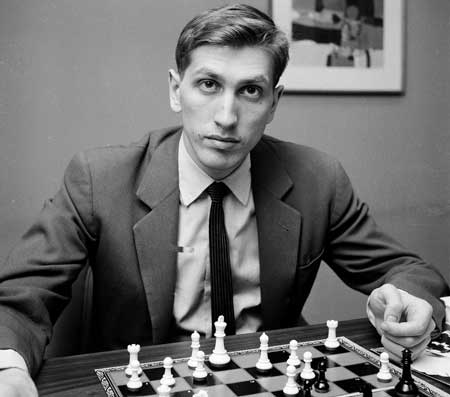
CM: What is so extraordinary about Fischer as a chess player?
EG: Fischer was kind of mean, and is quoted as saying that the reason he liked to play was to see them squirm.
CC: That’s a very American trait of chess players by the way. Russians are more polite. However, Fischer’s games are breathtaking – sometimes you get the feeling you’ve never seen anything quite like it. His energy, his level of knowledge and his commitment to the game raises him head and shoulders over anyone else.
CM: Is there truly something idiosyncratic about his play?
CC: He’s very creative and very knowledgeable, and puts lots and lots of energy into every game. His focus is incredible, which is hard to explain to non-chess players. He didn’t play games to an intentional draw, he always played to win. European chess strategy is, to the contrary, full of draws of all sorts: strategic draws, lazy draws, people not wanting to play that day.
MC: He was actually less idiosyncratic than most players. Fischer had a very all-around game but had a real determination to find the right move in any position. Fischer had an extreme monomania with the game. The Russians generally have much more feeling for chess as part of a well-rounded character – Mark Taimanov (1926 – ), for example, was a concert pianist. There are many Grandmasters from other countries who’ve had a variety of other talents, which, to be fair, is true of some American players as well. For Fischer, however, chess was so much what his life was about that he needed to win every game.
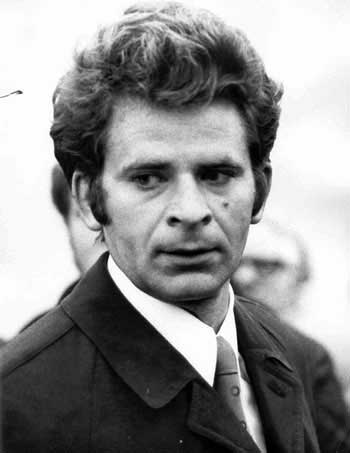
CM: Were the other great Russian players Spassky, Karpov, Kasparov well-rounded as well?
MC: Anyone was more well-rounded than Fischer!
CC: He was monomaniacal. The European chess players are generally all college educated, they’re all married, and they all have children. In Russia, they’re all socially very acceptable as well, and have high standing in their society. In this country chess players have historically not had a high standing. It’s the opposite here, actually; chess is more like a hobby.
MC: Fischer did, to some extent, change how chess was perceived here. By having a weird and prickly personality, he was able to get media coverage in a way that hadn’t happened before and vastly raised the amount of money that a world championship contender could make.
CM: What was Fischer’s training and who were his mentors?
EG: My understanding is that Fischer was basically a self-taught player. He had some coaches as a kid, but they weren’t very good players. He was already the US Champion before he dropped out of high school, which he did as soon as he could. (He went to Erasmus Hall High School in Brooklyn with Barbra Streisand and Neal Diamond.)
CC: Jack Collins, who was a paraplegic, had a strong influence.
CM: Apparently Fischer and Collins started a club in Collins’ home called The Hawthorne Chess Club.
MC: A lot of strong players came there.
EG: They were called Collins’ Kids.
CC: Collins was still reaching out across the country to recruit talented chess kids until he passed away in the 1990s.
CM: Did you see the documentary Brooklyn Castle (2012) about chess in the NY city schools? Is there an equivalent program in Boston?
CC: Though there are some after school programs, this is the back woods of chess development. The program in New York City, Chess in the Schools, is highly developed. They have regular tournaments and professional chess teachers who get paid.
CM: How do you regard Fischer’s accusation, publicized in Sports Illustrated in 1962, that the Soviets were colluding against him?
MC: I tend to think it was partly true. There have been accusations of cheating over the years that are a bit far-fetched – one player accused another of getting signals from what color yogurt someone had given him – but, in that case with Fischer, it may not have been so far-fetched. Chess was one of the ways the Soviets used to show the superiority of communism and were strongly motivated to overcome him. Fischer’s paranoia went to far greater lengths later on, but, at that time, his concerns were somewhat justified.
CC: Fischer’s complaint was that the Soviets sought out quick draws with one another but fought like hell against everyone else and he assumed they were after him in particular, but they were actually after everybody else too.
MC: Another factor was that in those days there were adjournment periods during tournament games so both players could study positions overnight. A lot of Russian players went to tournaments together which, at those times especially, represented an advantage over a lone wolf like Fischer. These days you don’t have adjournments of that sort because everyone would just run their computers overnight to solve the position.
CM: Do you remember when Fischer played against MIT’s Greenblatt computer in 1977? Apparently he won all the games against it.
CC: Ben Landy, a local and quite competent player affiliated with the Boylston Chess Club, apparently had lost to Richard Greenblatt’s earlier MacHack computer in 1967, and Fischer presumably said that Landy was “a disgrace to the human race.”
MC: In the 1970s, the three of us here could beat computers – that was not such an exceptional thing.
CM: And now?
MC: Now, even the world champion says he doesn’t like to play computers because it’s too depressing.
CC: I have a program on my phone that can beat me. It’s a cheap, five-dollar version of Shredder.
CM: What does that say about human competition in chess at this point?
EG: It was thought for a while that computers would end chess for humans, but it’s not at all true.
CC: As long as we can prevent cheating with computers, humans will continue to play chess. Computers have not solved chess. Humans do not play like computers, so it’s still a competitive game. Computers do have their role, but it’s not going to put the game out of business.
MC: Running has been a popular sport for millennia, and the advent of automobiles, which are obviously much faster, has not diminished the enjoyment of watching humans run.
CM: How do you see Fischer’s emotional and psychological decline over the years?
EG: He never developed any career outside of chess, so when he quit chess there really wasn’t anything for him to do.
CC: There was just an ongoing progression of a mental illness. Avenues started closing in on him that became more pronounced later on. From the time of his withdrawal from chess in 1975 until he showed back up in 1990 was a very dark and isolated period for him.
MC: The roots of Fischer’s madness were evident pretty early, especially evidenced in his attraction to anti-Semitism as a teenager. Though Fischer’s mother was Jewish (as likely was his biological father, though his paternity remains contested), one of the chess clubs he went to early on was the Log Cabin Chess Club in New Jersey which had some prominent anti-Semitic, pro-Nazi members.
CC: A lot of his problems came from his mother. She had two children to support and couldn’t keep a job. Much later on, after Fischer lost control over belongings kept in a storage facility, he went on the radio in the Philippines to rant at great length about the international Jewish conspiracy which confiscated his personal possessions.
MC: There was also a similarly anti-Semitic interview in Hungary in 1999. He was staying with the chess-playing Polgars for a while, and, ironically, they are Jewish. Yet, most of the notorious interviews were in the Philippines a few years later. They were not just anti-Semitic, but also anti-US, talking about how great it was that 9/11 occurred, and so on.
CM: Journal entries of Fischer’s from 1999 said things like “Death to the Jews – just kill the mother@#$%ers” and “It’s time to start randomly killing Jews.” Oddly, reports are that Fischer had cordial relations throughout his career with many Jewish chess players.
CC: His mother left him when he was sixteen, so he was pretty much on his own from that time. A lot of wealthy Jews sponsored Fischer early on and kept him alive. And there are many, many Jewish chess players – Spassky himself is Jewish, as is Kasparov, and Fischer had cordial relations with them all. I think it’s just a sign of mental illness. And it got much worse after 1975.
CM: Do you have anything to add about Fischer’s affiliation from the mid-1960s to the late 1970s with the Worldwide Church of God.
MC: It was a pretty big evangelical church at the time. For a while I think he tithed a lot of his money to them.
CC: Apparently he became disillusioned…
CM: … and accused them of Satanism by the time he left.
CC: The way he went over the edge was deeply disappointing to a lot of us.
CM: There was a game during the Fischer-Spassky match – game 6 – that the film touts as the best chess game ever played. Is that true?
CC: That’s clearly not the case. It is, however, a very good game, as are many of the other games in that match.
CM: In the film the game is depicted as a very idiosyncratically played game that caught Spassky unawares and that Spassky, in awe of Fischer, stood up and applauded him at the end.
EG: The sixth game was the turning point in the match because that’s when Fischer took the lead. Fischer did play different openings during the World Championship than he had before. Spassky hadn’t played much in the preceding several years, so was probably out of shape and not well enough prepared.
MC: It’s not so unusual for top players to prepare different openings for these big matches than they’re known to play, because they know their top opponents will be studying their traditional approaches. But chess in the media is often way off – they often, for example, set up the board completely wrong.
CC: My hair starts going on fire when I see those kinds of things. All they have to do is call me, pay me fifty bucks, and I’ll set everything right for them.
MC: When I was Executive Director of the US Chess Federation, I did get a call from a TV program asking about whether a certain piece of dialogue made sense from a chess point of view. It didn’t, and I corrected it.
CC: In Pawn Sacrifice, when Bobby Fischer (Tobey Maguire) is talking to Bill Lombardy (Peter Sarsgaard) about chess, it’s nonsensical – it’s just not the way you talk about these games and these positions.
MC: About Spassky applauding Fischer – because of his instability, no one knew whether Fischer would actually show up for these matches. Even Secretary of State Kissinger got involved to try to persuade him to continue playing, and Spassky probably got up to applaud Fischer to try to keep him playing as well. It was always unsure at this point how stable Fischer would be.
CM: What does the title “Pawn Sacrifice” signify to you?
CC: It makes no sense to me.
MC: Pawn sacrifices are quite frequent in chess. Often one sacrifices “material” to gain other advantages, like position, and the pawn is the least costly piece.
CM: Wasn’t there a pawn sacrifice in one of the early Fischer-Spassky games?
CC: It was pawn Fischer mistakenly took, not a sacrifice. Typically, you just don’t take that pawn. You don’t even think about it.
MC: It’s the kind of trap that usually catches beginners.
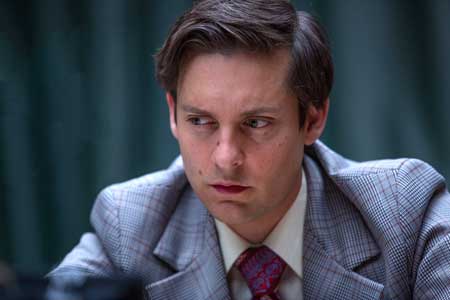
in “Pawn Sacrifice”
Photo: Takashi Seida
CM: What do you think of Tobey Maguire’s characterization of Fischer?
EG: I think he played the part very well but the character he played in the movie is more likable than the real Fischer.
CC: He’s miscast physically. Bobby Fischer was 6′ 3″ and Maguire is short. Fischer also had a very thick Brooklyn accent which Maguire did not capture, nor did he capture his mannerisms. The film also portrays Fischer as a wide-eyed crazy person even from day one, and he wasn’t like that at all. Even in an interview with Dick Cavett which he did after the Fischer-Spassky match in 1972 – you can catch it on YouTube – he’s more than reasonable and sensible – he’s a bit shy, but he’s not crazy.
EG: I can’t imagine an actor who could’ve played the part better.
CC: Regarding the whole issue of the way the media tends to deal with it, and with the portrayal of chess in the film – they don’t actually move the pieces right, and don’t act like chess players. We should have run a boot camp to help them move the pieces and to press the clock like real chess players. If you look at the chess skit Bobby Fischer did with Bob Hope in 1972 (also on YouTube), you can actually see how Fischer moves the pieces – there’s an elasticity to it, almost like sleight of hand, or like breathing.
EG: I’ve been told by people they can tell I’m a master just by the way I move the pieces.
CM: How about Michael Stuhlbarg’s portrayal of Fischer’s manager, Paul Marshall?
CC: The subject of Marshall is itself interesting. I talked with Ed Zwick (the film’s director) about this. He thought that Marshall was serving as a conduit for money from the White House to Fischer as a Cold Warrior, that Nixon and Kissinger felt that Fischer should be supported to oppose the Soviets.
MC: The Russians treated the Olympics as a proof of superiority and were very concerned about how many gold medals they won, so it’s entirely possible that the US administration wanted some kind of victory in the chess arena. When I was about twelve, during the Kennedy administration, I wrote a letter to NASA and said “if you really want to drive the Russians crazy, you should hold the first chess game in space.” I got a lot of responses. Apparently the letter bounced around to a number of government agencies which didn’t know they were corresponding with a twelve year old. But it really would have bothered the Russians to do that; they did make a big deal about it when they did themselves eventually play the first chess game in space.
Pawn Sacrifice opened in the Boston area on September 25th.
– BADMan
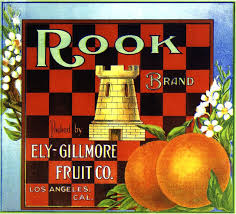
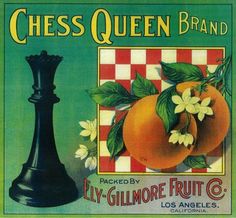
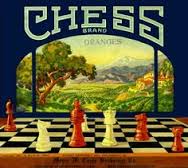
Leave a Reply